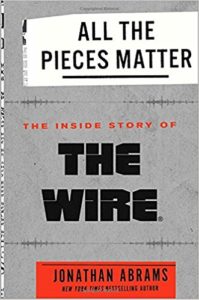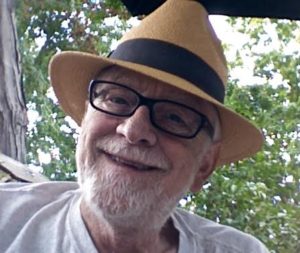The Wire All the Pieces Matter Book Review
Review by Robert R. Thomas
Aptly titled, Jonathan Abrams' book demonstrates his premise via an oral history that focuses on the creation of The Wire, a critically acclaimed HBO television series that ran from 2002 to 2008. Abrams' book is an engaging dialogue script. But this script is a well-edited transcription of recorded interviews rather than a script written by writers to exist performed by actors. The author supplies concise, connective narrative tissue as the chat rolls through the five seasons of The Wire, including the earlier and later of the creation.

While Simon and Burns are the visionary co-creators of The Wire, the co-creators of the HBO production are anybody involved in bringing the project to fruition. Abrams interviewed and recorded all the principals involved, including the HBO executives, and then finely wove these interviews into a lengthy chat between the principals most their collegial creation. Calculation historic writers similar George Pelecanos, Richard Price, and Dennis Lehane to the writers' room while seasoning the production liberally with a talented crew of directors, cinematographers, and actors, some professional and some not, results in a stout stew that is The Wire also every bit ALL THE PIECES MATTER.
Every bit an gorging reader and a writer, I savour a adept story. But what I relish fifty-fifty more is the backstory. How did this telling come to be? What is the artistic procedure here? In the case of The Wire, Abrams offers all the co-creators their own voices to tell this backstory.
The spine of The Wire is the superb writing, equally is evidenced throughout Abrams' oral history. Some examples:
DOMINIC West (DET. JIMMY MCNULTY): "(The Wire) had the depth and telescopic of a swell, epic novel."
CLARKE PETERS (DET. LESTER FREAMON): "It was more similar (Flavour) Four when it started to feel like more than just a show. That's when I think we all began to realize that nosotros had been hired to exist actors on a mission. The mission was to brainwash the public to connect the dots, between local regime, the economic situation that a city might find itself in, what's happening with your children in school, and while you might exist frustrated virtually that, the drug situation, the then-called state of war on drugs, which we know is a consummate farce."
Season Four "is the best season of television receiver that'due south ever been made," according to author George Pelecanos. The opening scene of the first episode features a striking functioning by a non- professional thespian, Felicia "Snoop" Pearson, buying a cordless nail gun in a hardware store. Snoop, the grapheme, is an androgynous killer. The purpose of the gun is to reseal the plywood coverings of vacant buildings in which she and her partner Chris Partlow stored bodies. The dialogue between Snoop and the hardware salesman is as priceless equally her overall functioning in The Wire. Information technology is also i of the very few instances in which an actor was allowed to go off script.
DAVID SIMON (CREATOR): Nosotros'd let her exist off book. We permit her sort of get her ain words. But that (scene) was a very specific metaphor about teaching. I wanted her to say the words of it. I remember going to her and saying, "Expect. You're an incredible presence, and nosotros hired y'all because you're an incredible presence and you're very existent, but the question for you now is: Practise you desire to be a professional actor? Because this is the transition, because I have no doubt that you tin be yourself in forepart of the photographic camera. Y'all've been doing information technology now for three or four episodes. You did well concluding year, but here's a moment where I'yard going to rely on you to carry a bigger burden on the story, and so I need to know that when I send the pages, the pages volition prevail and that you'll find a style to say what's on the page and make information technology your own and brand it real. That is acting. Information technology'south going to require work and it's going to crave struggle. It's not going to come naturally. Cypher comes naturally that's this complicated. Information technology doesn't mean y'all don't have talent. It means this is going to require work".
FELICIA "SNOOP" PEARSON: At first, I didn't get information technology, because that was my 2d season or whatever. But the writers and the producers was similar, "Man, you lot the first face everybody gonna see. This is a existent big deal." And so, I was like, "Word?" Then everybody was like, "Yeah, Snoop. It'southward a big deal." I was notwithstanding humble, but I was excited. That scene right there, I think that only took us similar two hours, and that's with them setting everything up, every angle or whatever. Took like, let's say 3 hours. It was a very fun scene."
Stephen King said of Snoop: "Perchance the most terrifying female villain to always announced in a tv set serial." Snoop is deadbang street, in her life and her character in The Wire. How she got involved with The Wire is as fantastical as her performance. How the experience truly inverse her existent street life is but ane of many life-altering experiences for many members of the bandage and coiffure. Such personal revelations add to theme of humanity emphasized throughout The Wire and Abrams' oral history.
GBENGA AKINNAGBE (CHRIS PARTLOW): The fascinating and bully thing about The Wire is that it shows y'all how people go the people they're going to go, whether that'due south skilful or bad. We get to humanize these people, despite the horrific or great things they do.
Omar Little, portrayed by Michael G. Williams, was another remarkable character, and Barack Obama's favorite grapheme in the series. The backstory on Omar is every bit remarkable.
GEORGE PELECANOS (WRITER/PRODUCER): Donnie [Andrews] was in the writers' room with us, and he was the model for Omar. The funny affair about that scene where Omar jumps out of the apartment balustrade, breaks his leg: Donnie did that, and some stuff on the Net was, "at present they've jumped the shark. That could never happen." We sort of laughed virtually that, because when Donnie jumped out of that balustrade after a shootout, it was off a floor college than the one Omar jumps out of. Donnie broke his leg, only he walked on to a waiting auto, got in it, and sped away.
"(The Wire) never told; it showed," as Abrams describes the process.
WENDELL PIERCE (DET. WILLIAM "BUNK" MORELAND): It challenged the states to recall about the material that we were dealing with. It challenged people who watched information technology. The reason we still are engaged with the evidence today is because it really expressed the most of import function of fine art, which is the form where nosotros reflect on what our values are, decide what they are and so human activity on them. It'southward where we have the debate of what we believe, where we failed, where we've triumphed. That's what the art is to the community as a whole: a place where you reflect on these issues and say, "This is what we value, and permit's act accordingly."
CLARKE PETERS (DET. LESTER FREAMON): The Wire promoted a conversation that is still ongoing. It has become a reference point in universities, not only hither, simply in England besides. It's a topic to exist studied. It was well studied, well researched in being put together. I call back we accomplished the mission in that conversation. We opened the chat, and it is still ongoing.
ANDRE ROYO (REGINALD "BUBBLES" COUSINS): The Wire was the subconscious understanding of how a city is destroyed.
METHOD MAN (CALVIN "CHEESE" WAGSTAFF): Each season was consistent with what Baltimore was nearly. That'south why it helps to have people that are in the communities, policing the communities, writing this stuff, because they sympathize it and have their fingers on the pulse of what's going on in these neighborhoods.
DENNIS LEHANE (WRITER): Information technology'due south i of the most caustic, scabrous visions of America in pass up that'south always been put on the screen. And it changed TV a bit, rushed its borders a lilliputian further than where they'd previously been positioned.
"David Simon," writes Abrams, "occasionally countered critics of The Wire by maxim that the evidence's writers illustrated the earth they themselves had experienced and inhabited."
Fittingly, ALL THE PIECES MATTER concludes with David Simon: "Stories have a beginning, a centre, and an end, and there's other arguments to be had."

Robert R. Thomas
The book's acknowledgments pages underscores the collaborative creation that Abrams' oral history is, which seems a fine homage to a archetype American television series.
If you have a penchant for stunning writing and masterful television production, The Wire delivers, as anyone who has watched it realizes.
If you lot want to read an engaging account of its backstory, ALL THE PIECES MATTER is a multi-faceted resource and an excellent addition to the overall arc of The Wire.
EVM lath member and book reviewer Robert R. Thomas can exist reached at capnz13prod@gmail.com.
Source: https://www.eastvillagemagazine.org/2018/03/31/review-all-the-pieces-matter-the-inside-story-of-the-wire/
0 Response to "The Wire All the Pieces Matter Book Review"
Post a Comment